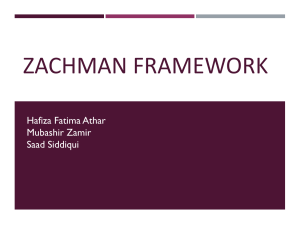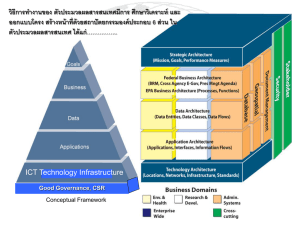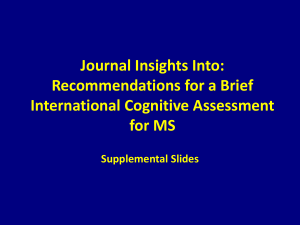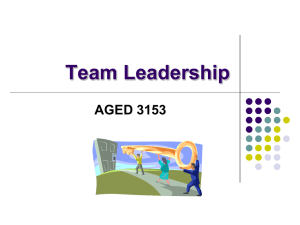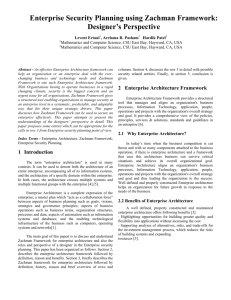1_Zachman_EAF_Tutorial
advertisement
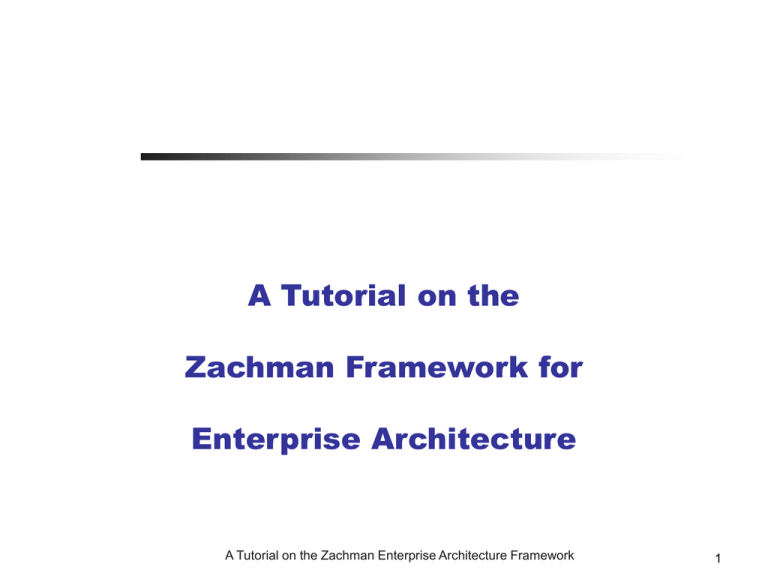
A Tutorial on the Zachman Framework for Enterprise Architecture A Tutorial on the Zachman Enterprise Architecture Framework 1 Zachman Framework A Tutorial on the Zachman Enterprise Architecture Framework 2 Zachman Framework VA Enterprise Architecture DATA What FUNCTION How NETWORK Where PEOPLE Who TIME When MOTIVATION Why SCOPE (CONTEXTUAL) Things Im portant to the Business Processes Performed Business locations Important Organiz ations Ev ents Signific ant to the Business Business Goals and Strategy Planner Entity = Class of Business Thing Function = Class of Business Process Node = Major Business Locations People = Major Organiz ations Time = Major Business Event Ends/Means = Major Business Goals ENTERPRISE MODEL (CONCEPTUAL) Semantic Model Business Process Model Business Logistic s System Work Flow Model Master Schedule Business Plan Owner Ent = Business Entity Proc = Business Process Node = Business Location People = Organization Unit Time = Business Event Rel = Business Relationship I/O = Business Resources Link = Business Linkage Work = Work Product Cycle = Business Cycle End = Business Objectiv e Means = Business Strategy SYSTEM MODEL (LOGICAL) Logical Data Model Application Architecture Processing Structure Business Rule Model Designer Ent = Data Entity Rel = Data Relationship Proc = Application Function Node = IS Function People = Role I/O = User Views Link = Line Characteristic s Work = Deliv erable Time = System Event Cycle = Processing Cycle End = Structural Assertion Means = Action Assertion TECHNOLOGY MODEL (PHYSICAL) Physical Data Model System Design Control Structure Rule Design Builder Ent = Segment/Table Rel = Pointer/Key Proc = Computer Function Node = Hardware/Softw are People = User I/O = Data Elements /Sets Link = Line Specifications Work = Screen Format Time = Ex ecute End = Condition Cycle = Component Cycle Means = Action Program Security Architecture Timing Definition Rule Design Data DETAILED REPRESENTATIONS Definition (OUT-OF-CONTEXT) Distributed System Architecture Technology Architecture Netw ork Architecture Human Interface Architecture Presentation Architecture Sub-Contractor Ent = Field Rel = Address Proc = Language Statement Node = Addresses I/O = Control Block Link = Protocols People = Identity Work = Job Time = Interrupt Cycle = Machine Cycle End = Sub-Condition Means = Step FUNCTIONING ENTERPRISE Data Function Netw ork Organiz ation Schedule Strategy Ent = Rel = Proc = I/O = Node = Link = People = Work = Time = Cycle = End = Means = DATA What FUNCTION How NETWORK Where PEOPLE Who TIME When Based on work by John A. Zachman SCOPE (CONTEXTUAL) Planner ENTERPRISE MODEL (CONCEPTUAL) Owner SYSTEM MODEL (LOGICAL) Designer TECHNOLOGY MODEL (PHYSICAL) Builder DETAILED REPRESENTATIONS (OUT-OF-CONTEXT) Sub-Contractor FUNCTIONING ENTERPRISE MOTIVATION Why A Tutorial on the Zachman Enterprise Architecture Framework 3 Zachman Framework Row 1 – Scope External Requirements and Drivers Business Function Modeling Row 2 – Enterprise Model Row 3 – System Model Business Process Models Logical Models Requirements Definition Where Who When Why Contextual Contextual 2 Conceptual Conceptual 3 Logical Logical 4 Physical Physical Row 6 – Functioning Enterprise 5 As Built As Built Functioning Functioning Row 5 – As Built As Built Deployment How 1 Row 4 – Technology Model Physical Models Solution Definition and Development What Functioning Enterprise Evaluation 6 What How Where A Tutorial on the Zachman Enterprise Architecture Framework Who When Why 4 Framework Rules Basic Model = Entities and Relationships Rule 1: Entity Relationship Entity Columns have no order Rule 2: What Each column has a simple, basic model Who When Why Contextual Conceptual Conceptual Logical Logical Each row represents a distinct view Physical Physical Rule 5: As Built As Built Functioning Functioning Rule 3: Rule 4: Each cell is unique Where Contextual Basic model of each column is unique How What Rule 6: How Where Who When Why Combining the cells in one row forms a complete description from that view A Tutorial on the Zachman Enterprise Architecture Framework 5 Zachman Framework – Row 1 Scope/Planner’s View Motivation/Why Business goals, objectives and performance measures related to each function Function/How High-level business functions Data/What High-level data classes related to each function People/Who Stakeholders related to each function Network/Where VA locations related to each function Time/When Cycles and events related to each function External Requirements and Drivers Business Function Modeling What 1 How Where Who When Why Contextual Contextual Conceptual Conceptual Logical Logical Physical Physical As Built As Built Functioning Functioning What How Where A Tutorial on the Zachman Enterprise Architecture Framework Who When Why 6 Zachman Framework – Row 2 Enterprise Model/Designer’s View Motivation/Why Policies, procedures and standards for each process Function/How Business processes Data/What Business data Business Process Models Business Function Allocation Elimination of Function Overlap and Ambiguity What People/Who VA roles and responsibilities in each process Network/Where VA locations related to each process Time/When Events for each process and sequencing of integration and process improvements 2 How Where Who When Why Contextual Contextual Conceptual Conceptual Logical Logical Physical Physical As Built As Built Functioning Functioning What How Where A Tutorial on the Zachman Enterprise Architecture Framework Who When Why 7 Zachman Framework – Row 3 System Model/Designer’s View Motivation/Why VA policies, standards and procedures associated with a business rule model Function/How Logical representation of information systems and their relationships Logical Models Project Management Requirements Definition Data/What Logical data models of data and data relationships underlying VA information People/Who Logical representation of access privileges constrained by roles and responsibilities Network/Where Logical representation of the distributed system architecture for VA locations What 3 Time/When Logical events and their triggered responses constrained by business events and their responses How Where Who When Why Contextual Contextual Conceptual Conceptual Logical Logical Physical Physical As Built As Built Functioning Functioning What How Where A Tutorial on the Zachman Enterprise Architecture Framework Who When Why 8 Zachman Framework – Row 4 Technology Model/Builder’s View Motivation/Why VA business rules constrained by information systems standards Function/How Specifications of applications that operate on particular technology platforms Physical Models Technology Management Solution Definition and Development Data/What Database management system (DBMS) type requirements constrained by logical data models People/Who Specification of access privileges to specific platforms and technologies Network/Where Specification of network devices and their relationships within physical boundaries Time/When Specification of triggers to respond to system events on specific platforms and technologies 4 What How Where Who When Why Contextual Contextual Conceptual Conceptual Logical Logical Physical Physical As Built As Built Functioning Functioning What How Where A Tutorial on the Zachman Enterprise Architecture Framework Who When Why 9 Zachman Framework – Row 5 As Built/Integrator’s View Motivation/Why VA business rules constrained by specific technology standards Function/How Programs coded to operate on specific technology platforms As Built Configuration Management Deployment Data/What Data definitions constrained by physical data models What People/Who Access privileges coded to control access to specific platforms and technologies Network/Where Network devices configured to conform to node specifications Time/When Timing definitions coded to sequence activities on specific platforms and technologies 5 How Where Who When Why Contextual Contextual Conceptual Conceptual Logical Logical Physical Physical As Built As Built Functioning Functioning What How Where A Tutorial on the Zachman Enterprise Architecture Framework Who When Why 10 Zachman Framework – Row 6 Functioning Enterprise/User’s View Motivation/Why Operating characteristics of specific technologies constrained by standards Function/How Functioning computer instructions Data/What Data values stored in actual databases What People/Who VA personnel and key stakeholders working within their roles and responsibilities Network/Where Sending and receiving messages Time/When Timing definitions operating to sequence activities Functioning Enterprise Operations Management Evaluation 6 How Where Who When Why Contextual Contextual Conceptual Conceptual Logical Logical Physical Physical Integrated Integrated Functioning Functioning What How Where A Tutorial on the Zachman Enterprise Architecture Framework Who When Why 11 VA Zachman Framework Portal A Tutorial on the Zachman Enterprise Architecture Framework 12
